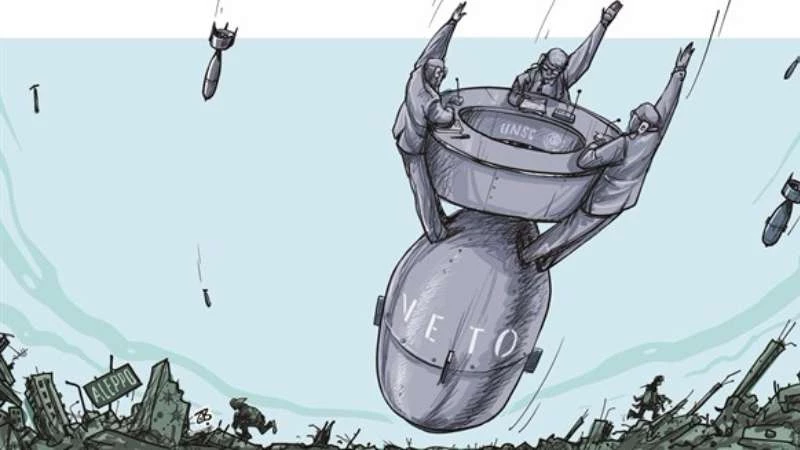In its charter, the newly formed international organization set out to maintain global peace and security through effective collective measures for the prevention and elimination of mass violence caused by war and conflict. It promised to eradicate acts of aggression or other breaches of the peace through conformity with the principles of justice and international law.
To make good on these promises the Security Council was entrusted with ensuring prompt and effective action by the nascent organization in defending human rights in cases such as the one that has unfolded in Aleppo over the last four years.
Tragically these promises and hopes were dashed by a sad reality. Not for the first time innocent people, women and men, young and old, were betrayed by the international community and its supposed arm of protection for those in desperate need, the Security Council.
It is hard not to agree whole heartedly with Ban ki-Moon, who poignantly stated in his last press conference as the UN Secretary-General last week that “the carnage in Syria remains a gaping hole in the global conscience.” The outgoing chief of the UN added that “Aleppo is now a synonym for hell.”
No one will contest either assertion, but it is the organization he led for nearly a decade that failed the people of Aleppo, similar to the abandonment of the Tutsis in Rwanda, the Bosnian Muslims in Srebrenica, and the people of Darfur to large scale genocide. In Eastern Ukraine, Russia’s daily violent intervention continues, unchecked and unpunished. It leaves open the question whether this charade of collective security as a means of guaranteeing everyone’s human rights had its day?
For countless years UN member states have discussed the desperate need to reform the United Nations so it can reflect both the international political landscape of the 21st century and the challenges it faces, but to no avail.
Body of inaction
It does not take a genius to recognize that the Security Council became a body of inaction and paralysis. The United Nations should have been a much improved version of its predecessor the League of Nations, which was a disastrous failure even before its inception. Its impotence contributed to the complete collapse of the world system and the subsequent world war that claimed the lives of tens of millions of people and the worst genocide of our times.
Considering this, the UN may seem to be an upgraded version in terms of collective security, but probably really only by a small margin. Wars have been a constant fixture in world affairs since 1945, genocide and widespread war crimes and crimes against humanity continued uncontained, and in many cases, without the culprits facing international courts.
Ban ki-Moon’s admission of failure echoes what his predecessor Kofi Annan expressed about Rwanda, when he declared that “In their greatest hour of need, the world failed the people of Rwanda.” In a scathing criticism of the United Nation’s role in Srebrenica, the Human Rights Watch report bluntly stated that United Nations peacekeeping officials denied the requests from their own forces stationed within the enclave to stop Bosnian Serb forces from overrunning it.
Consequently, systematic mass executions of thousands of civilian men and boys, rape and other forms of abuse of civilians took place. Preventing, or at least containing these horrors was the basis for the formation of the United Nations, and that is where it fails time and again.
Witnessing the recurrence of these mass abuses of human rights in Aleppo, with thousands of people still stranded in the cold winter weather, one cannot excuse the international community for its inaction. It casts serious doubt as to whether the United Nations is capable and willing to learn from its past failures.
Moreover, in the world of instant communication carnage and massacres are transmitted straight to all of us as they happen, not only from Aleppo, but from across Syria. We have instantly witnessed atrocities that included the use of chemical weapons, aerial bombardment of schools and hospitals, rape, extrajudicial killings, systematic targeting of civilians, the use of barrel bombs and widespread torture.
A thin veneer
These actions are carried out by governments that are members of the UN – Syria and Iran, not to mention Russia, who is a permanent member of the Security Council. It leaves the United Nations appearing as no more than a very thin veneer, beneath which hides the same old international system ruled by military power and brutality as its main currency.
Samantha Power, US ambassador to the UN, ripped into Syria, Russia and Iran in the Security Council last week, asking them whether they have no shame in the face of the suffering they are inflicting on the people of Aleppo. Ms. Power, who is a genuine defender of the notion of Responsibility to Protect, did not expect or need an answer.
No country with any trace of decency would have been involved in the killing of more than 400,000 people, made millions of people refugees or displaced and committed all the other well documented atrocities. However, it is also her country, among other Western countries, that opted to stay away from active involvement in protecting the Syrian people from Assad and his unscrupulous henchmen at home and abroad. Is this not shameful too?
It left the United Nations as a toothless talking shop in which lip service is widely paid to the supremacy of international law and human rights, while reality outside the building on the East River in New York continues to be grim.
In Syria, the ideal of collective security and universal human rights, in which the international community shoulders the responsibility to protect, has suffered a massive, maybe irreparable, setback. It is left for the new Secretary-General, António Guterres, in the new year to carry out the unenviable, perhaps impossible, task of rebuilding the UN’s credibility. If he fails, he may well be the last leader of this international organisation.
Yossi Mekelberg (Al Arabiya English; 23 December 2016)



التعليقات (0)